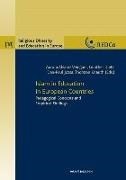Read more
Relations between Muslims and the public education systems of Europe are often characterised by tensions. There is often still a perceived incompatibility between the claims of individual Muslims or Muslim communities on the one hand and the aims of public education in Europe on the other. The relatively recent presence of Islam in much of Europe, the internal diversity of Muslim communities, the lack of a centralized, hierarchical church-like structure - different arguments are used to justify such a discriminatory treatment of one of the largest faith communities in Europe.
Nevertheless, as this book aims to illustrate, there are already rich and diverse experiences throughout Europe of how to integrate Islam into the national and regional school systems, particularly in primary, but also in secondary education. Accordingly, this book provides some analyses of the ways in which Islam is integrated in education in certain regions of Spain, the Netherlands, France and England. These analyses are paralleled by empirical findings concerning the role of religion in the life of young Muslims, their views concerning religion in school, and the impact of religion in education and society in Spain, the Netherlands, Norway, Germany, France and England.
List of contents
Foreword (Wolfram Weisse); Introduction (Aurora Alvarez Veinguer, Gunther Dietz, Dan-Paul Jozsa & Thorsten Knauth); Islam and Education in Spain (Javier Roson, Sol Tarres & Jordi Moreras); Islam within the Framework of LaiciteA". Islam and Education in France (Anna van den Kerchove);Islam in Education in the Netherlands (Marjoke Rietveld-van Wingerden, Wim Westerman & Ina ter Avest); A Qualitative Narrative of the Transition from Independent to Voluntary Aided Status. A problem for the Concept of the 'Muslim School' (Damian Breen); Emancipation or Disengagement? Islamic Schools in Britain and the Netherlands (Inga Niehaus); Muslim Students Views on Religion and Education. Perspectives from Western European Countries (Dan-Paul Jozsa)
About the author
Gunther Dietz holds an M.A. and a Dr.phil. in Anthropology from Hamburg University; he has been working on multiculturalism and intercultural education at the Laboratorio de Estudios Interculturales at the University of Granada, at the Institute for Comparative and Multicultural Studies at Hamburg University, at the School for Postgraduate Interdisciplinary Research on Interculturalism and Transnationality at Aalborg University, at the Steunpunt Intercultureel Onderwijs at Ghent University and at the Center for Comparative Immigration Studies at the University of California San Diego (USA). He is now a research professor in Intercultural Studies at Universidad Veracruzana, Xalapa, Mexico.

